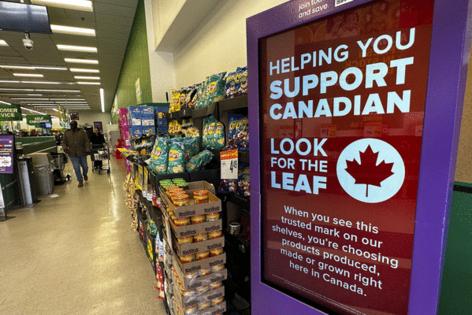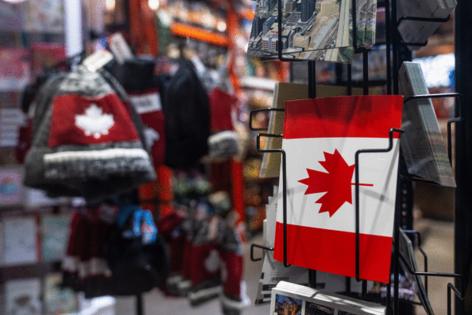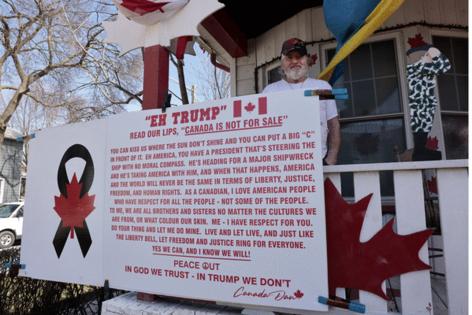Trump threats do the unthinkable: transform Canadians into flag-waving, US-booing patriots
Published in News & Features
Kaile Shilling, a writer and former theology student, says she moved from Los Angeles to Canada during the first Trump administration to escape America's toxic politics. She never saw herself as the kind of person to hang a giant flag on the front of her house.
But after Donald Trump was reelected last fall and started threatening to turn America's famously polite and peaceful northern neighbor into the "51st state," Shilling's dual-citizenship husband unfurled an enormous red and white maple leaf banner on their home in Vancouver for all the world to see.
"When he did it, I went, 'F— YEAH!'" said Shilling, tossing her head back and laughing, clearly shocked by her own sudden outburst of passion and profanity.
She's not the only one feeling that way.
Instead of cowing Canadians, Trump's threats to annex their country have unleashed a wave of national fervor unmatched in living memory. Canadians are refusing to buy American products, canceling travel plans south of the border, even booing the U.S. anthem before professional hockey games.
And instead of feeling threatened by the backlash against their native land, many American ex-pats living in Canada are enthusiastically siding with their neighbors.
Nanci Burns, a retired social worker who was born in the U.S. and spent years with family in California before moving to Ottawa, said she's stunned by the transformation in public sentiment.
"I've never seen this level of patriotism. Everybody is pro-Canada and so afraid of losing their country," Burns said. "It's a universal voice, no matter where you go."
Burns recalled watching the recent Four Nations Face-Off hockey tournament, where the Canadian and American teams went head to head. After fans in Montreal booed the U.S. anthem before the first game, three fights broke out on the ice in the first nine seconds.
"I felt like we were gladiators," the otherwise soft-spoken, gray-haired retiree said with a laugh. "We'll just hash it out on the rink."
While the American players arguably won the fights — which they started — the Canadians won the tournament.
Months after Trump's pointed threats began, it's still not entirely clear what he really hopes to achieve.
In January, Trump told reporters he was considering using "economic force" to annex Canada, and in February announced the first in a slew of shifting tariffs on Canadian goods coming into the U.S.
He called the border an "artificially drawn line," and reminded Canadians that they rely on America for military protection. He has since said Canadians can't assume that will always be the case, and has repeated how much he would like their country to become America's "51st state."
Is it just hyperbole, an aggressive opening bargaining position in advance of the international trade war he has launched against friends and foes alike? Does he actually intend to use America's economic might against a sovereign nation to plunder its rich natural resources? Or, as some have suggested, was he trolling Canada's dashing former Prime Minister Justin Trudeau, because First Lady Melania Trump once kissed him in public and appeared to like it?
Whatever Trump's motives, Canadians are taking the implied threat very seriously, and the effect has been far more galvanizing than most outsiders probably could have predicted.
Perhaps the most obvious impact has been the sudden revival of Canada's previously moribund Liberal Party.
A few months ago, desperately behind in the polls and seemingly doomed in the upcoming federal election, Trudeau announced he was stepping down as prime minister and surrendering control of the party to a relatively nondescript former banker. The Conservatives, whose leader had been branded the "maple MAGA," seemed destined for a landslide victory.
But then Trump started with the 51st state threats and, before the Canadian conservatives knew what had hit them, "maple MAGA" became the most radioactive label in the land. Today, the Liberals and Trudeau's successor have surged 25 points in the polls and appear headed for a shocking come-from-behind victory later this month.
Trump's rhetoric "puts the fear of God into people here," Burns said.
While Canadians, by necessity, spend a lot of time parsing political drama in the economic and military superpower next door, it's probably safe to say most Americans spend almost no time thinking about Canada. As far as most of us know, they're all on the same side, like one big happy family shivering in perfect harmony.
Nothing could be further from the truth. Despite the county's enormous land mass, 90% of Canada's people live within 150 miles of the U.S. border. So they're stretched in a narrow band that runs 5,500 miles east to west, meaning the people at one end barely know the people at the other. And not surprisingly, Canada is as fractious and divided as any developed country in the world.
Toronto and Montreal — close neighbors — are riven by rivalries dating back to 18th century wars between England and France. The Atlantic provinces have fallen on hard economic times, amplified by the collapse of offshore fishing stocks, and are regarded by some of their fellow Canadians as kind of a frozen Appalachia. And many in beautiful, prosperous Vancouver stare back at their squabbling compatriots, across thousands of miles of towering mountains and mostly empty plains, and wonder if they wouldn't be better off on their own.
Despite the differences, the effrontery of a U.S. president mocking their relative weakness and implying that they're all just a bunch of wannabe Americans brought them quickly together.
True to their stereotype, Canadians have remained scrupulously polite to the American expats interviewed for this story, but there have been some awkward moments.
Graham Dodds, who teaches political science at Montreal's Concordia University, said he has seen "a little uptick in good-natured ribbing from friends," one of whom suggested he should pay an extra 25% of a recent bar tab — alluding to the Trump tariffs.
Gabriel Porath, who is from San Diego and studying at the University of British Columbia, said he and friends were at a concert recently when someone on stage challenged any Americans in the audience to raise their hands. It was all in good fun, Porath believed, but nevertheless, none of the Americans he was with chose to out themselves.
Shilling, 53, said she has been shocked and mystified by Trump's threats, but never demonized by her Canadian neighbors. They're capable of distinguishing between a U.S. presidential administration and individual American citizens — especially ones who made the choice to move to Canada.
Shilling came in 2020 in response to what she saw as the psychological grind of living in L.A.: the homelessness, the gun violence, and the fact that half the country had voted for Trump, whose policies and behavior she detested. It felt to her like, every day, you had to "smash a little part of your soul" to live in the U.S. and not have it "hurt all the time."
While her new neighbors don't hassle her about Trump's threats, Shilling said, some of her old ones from Silver Lake are in regular touch.
"My American friends are very jealous right now," she said with a laugh. "There's definitely a few who are like, do you have room in your house?"
©2025 Los Angeles Times. Visit at latimes.com. Distributed by Tribune Content Agency, LLC.












Comments